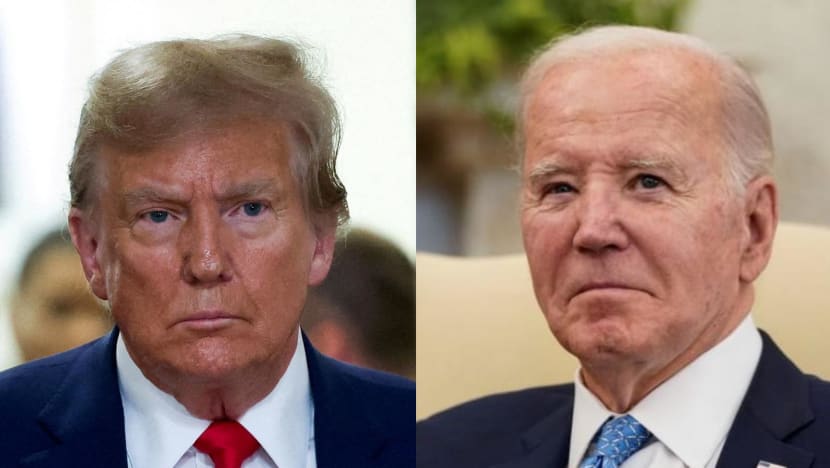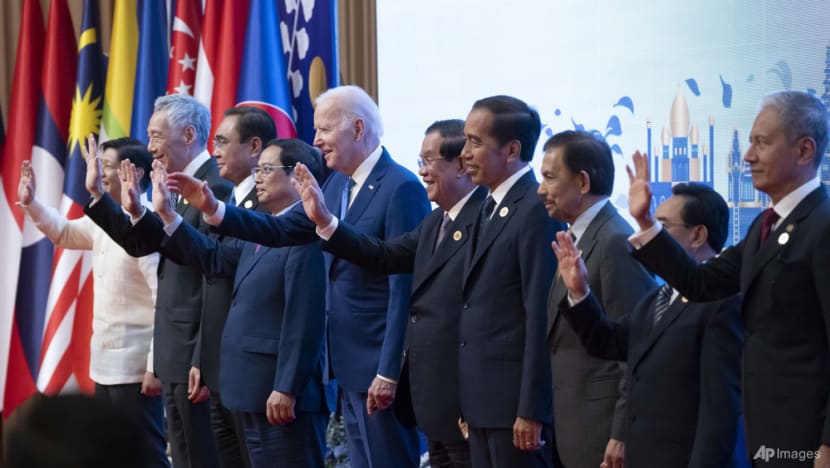Commentary: Another Biden or Trump term poses its own challenges to Singapore
In the US, there will be stark differences between a Biden or Trump second term. For Singapore and Southeast Asia, either administration brings their own challenges, says Steven Okun of APAC Advisors.

Former US president Donald Trump (left) and US President Joe Biden. (File Photos: Reuters/David Dee Delgado, Shannon Stapleton)

This audio is generated by an AI tool.
SINGAPORE: The 2024 US presidential election will be a rematch between US President Joe Biden and former president Donald Trump after both men won enough delegates from their respective parties on Tuesday (Mar 12).
While who will win remains too early to call, governments, businesses and investors around the globe must prepare for either a second Biden or Trump administration. The election’s outcome will impact Singapore and Southeast Asia, even though neither the country nor the region will likely be mentioned during the campaign.
Regardless of who gets inaugurated in January 2025, Singapore’s precarious balancing of geopolitics will continue.

AVENUES THROUGH WHICH BIDEN CAN WIN
During presentations on the US presidential campaign I have given in Singapore and around Southeast Asia over the past few months, I always end with a poll question for the audience: Who do you think will win, Joe Biden or Donald Trump?
Without fail, at least 80 per cent to 90 per cent presume victory for Mr Trump.
Given Mr Biden’s historically low approval ratings, the overwhelming number of Americans who believe the country is headed in the wrong direction, and Mr Trump outpolling the incumbent in handling immigration and inflation, observers abroad believe Joe Biden has little to no chance of winning again.
They should not be so certain. Three avenues form a path for the Biden campaign to win a second term.
First, so long as the economy continues to improve, with a corresponding increase in consumer confidence, Mr Biden’s approval rating should improve with them, increasing his electoral outlook.
Second, a significant number of women will vote solely on the issue of protecting their reproductive freedoms, which will increase Mr Biden’s odds of winning. The Democrats have won or outperformed in nearly every significant election since the Supreme Court eliminated the previous Constitutional right to abortion through Trump-appointed justices.
As Mr Biden said in his State of the Union address: "Those bragging about overturning Roe v Wade have no clue about the power of women in America.”
Third, the Biden campaign wants this election to be less a referendum on the president’s first term and more a choice on a second Trump term, given his predecessor remains unpopular nationally as well. Trump’s undisciplined call for cuts to social security are one such example of his making it easier for Biden to execute on that strategy.
WHAT TO EXPECT FROM A SECOND TRUMP TERM
In the US, a return to power of Donald Trump would have significant consequences domestically.
A Trump victory will result in efforts to root out the so-called “deep state” of civil servants, impacting the US government’s ability to function as it does now. His planned harsh crackdown on immigration will cause domestic pain socially and economically, as will a pullback from international affairs and climate action.
With global security risks more delicate than usual, there will be considerable impact on the rest of the world as well.
A second Trump term would mean weakened commitment to Ukraine and a significant reduction of US engagement in the North Atlantic Treaty Organization (NATO), if the US were to remain at all.
The fallout from such a shift would hit Asia as well, with countries such as Japan and South Korea likely to seek their own nuclear weapons, which would impact their relations with China and could have a spillover effect regionally.
In the Middle East, a Trump administration would be less likely to get involved in restraining Israel in its retribution against Hamas' Oct 7, 2023 attack, which the Biden administration has started to do more publicly. This could lead to further escalation of the conflict, which would directly affect Singapore’s maritime industry.
The imposition of 60 per cent tariffs on China and 10 per cent across the board, as Mr Trump proposed, would have negative economic consequences for countries that trade with China or the US – basically every country in the region.
The Trump administration would again shift away from the incumbent administration’s approach of working with partners and allies. Exiting the Paris Climate Accords again and pulling out of the Indo-Pacific Economic Framework as it did with the Trans-Pacific Partnership (TPP) are two near certainties, which will have negative consequences on the climate crisis and global trade.
A DIFFICULT BALANCING ACT
From Singapore’s perspective, a Biden or Trump 2.0 each brings challenges.
“The US is not new in having a penchant for unilateralism by putting America first and dealing with countries transactionally,” Bilahari Kausikan, former permanent secretary at Singapore’s Ministry of Foreign Affairs, explained to me.
While Mr Trump is widely seen as a disruptive force to multilateralism, it is worth noting that President Biden did not return the US to the TPP after then president Trump pulled out, reflecting domestic political considerations.
A second Biden or Trump administration would bring a continuing confrontational approach to China, but predicting what Mr Trump might do would be much more difficult.
For example, in 2020, the United States announced the consideration of a ban on TikTok after a request from then president Trump, who viewed the app as a national security threat.
In 2024, with the House passing legislation which may effectively do just that, Mr Trump changed his position, presumably because he now views TikTok as being a net positive for him as a campaign tool, or because of pressure from Republican campaign donors who have equity stakes in ByteDance, or both.
Preparing for an entirely transactional administration will be difficult. Either way, regional governments will move on, working with the US when they can, and working without them when they must.
WILDCARDS TO WATCH
In 2020, if about 44,000 votes went to Mr Trump instead of Mr Biden across the states of Arizona, Georgia, and Wisconsin, Donald Trump would be president today.
This year, the election will be close. A single event or person influencing thousands of votes could swing the election.
A guilty verdict in any of Mr Trump’s four criminal trials could hurt his campaign. The first, over hush money paid to adult film actress Stormy Daniels, kicks off on Mar 25. It may bring him personal jeopardy given the salaciousness of the subject.
While third-party candidates run in every presidential election, they are often electorally irrelevant. That may not be the case this time.
Robert F Kennedy Jr, Jill Stein or Cornell West - likely third-party candidates in 2024 - could each tip the election, likely from Mr Biden to Mr Trump. Now, if Mr Kennedy chooses the anti-vax and "anti-woke" American football star Aaron Rogers as his running mate as rumored, they could take more votes from Trump.
Meanwhile, the centrist group No Labels still lurks and appears to be securing some places on state ballots, albeit without any candidates. This could divert votes from President Biden.
Most significantly, there could be a not-so-secret weapon for Joe Biden. An endorsement from Taylor Swift at the right time, probably towards the end of September, could bring enough Swifties out to vote in key states and propel Mr Biden to victory.
If the past two weeks have taught Singapore anything, it’s that Taylor Swift can drive economics and international relations. Maybe she will teach the US the same lesson.
Steven R Okun is CEO of APAC Advisors and a senior adviser for global strategic consultancy McLarty Associates in Singapore.



















